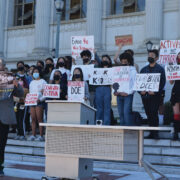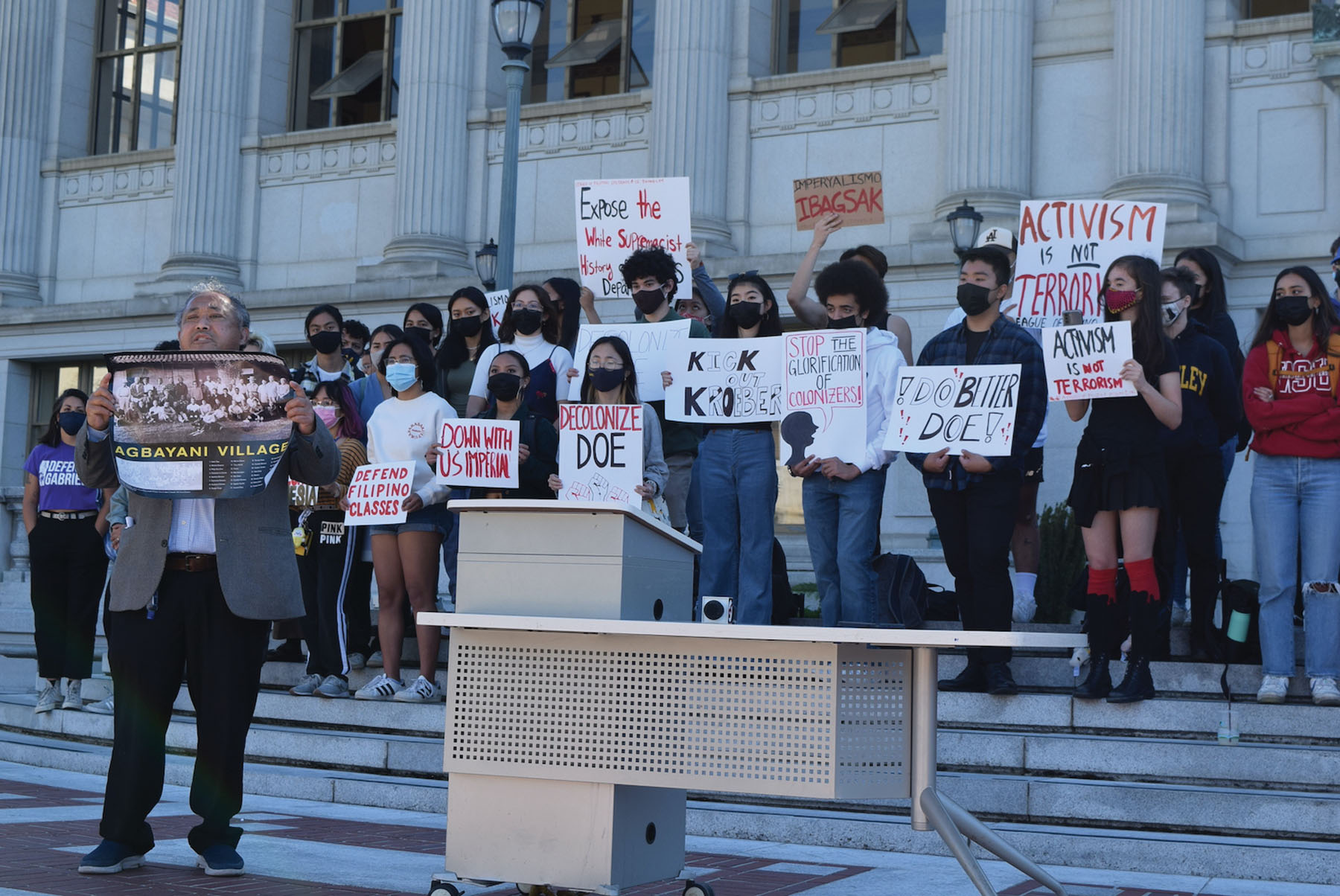
UC Berkeley Filipino American students and faculty, along with members of the school’s student government leaders and other community supporters, held a protest action on Thursday, October 28 to rally against an exhibit in the campus’ Doe Library.
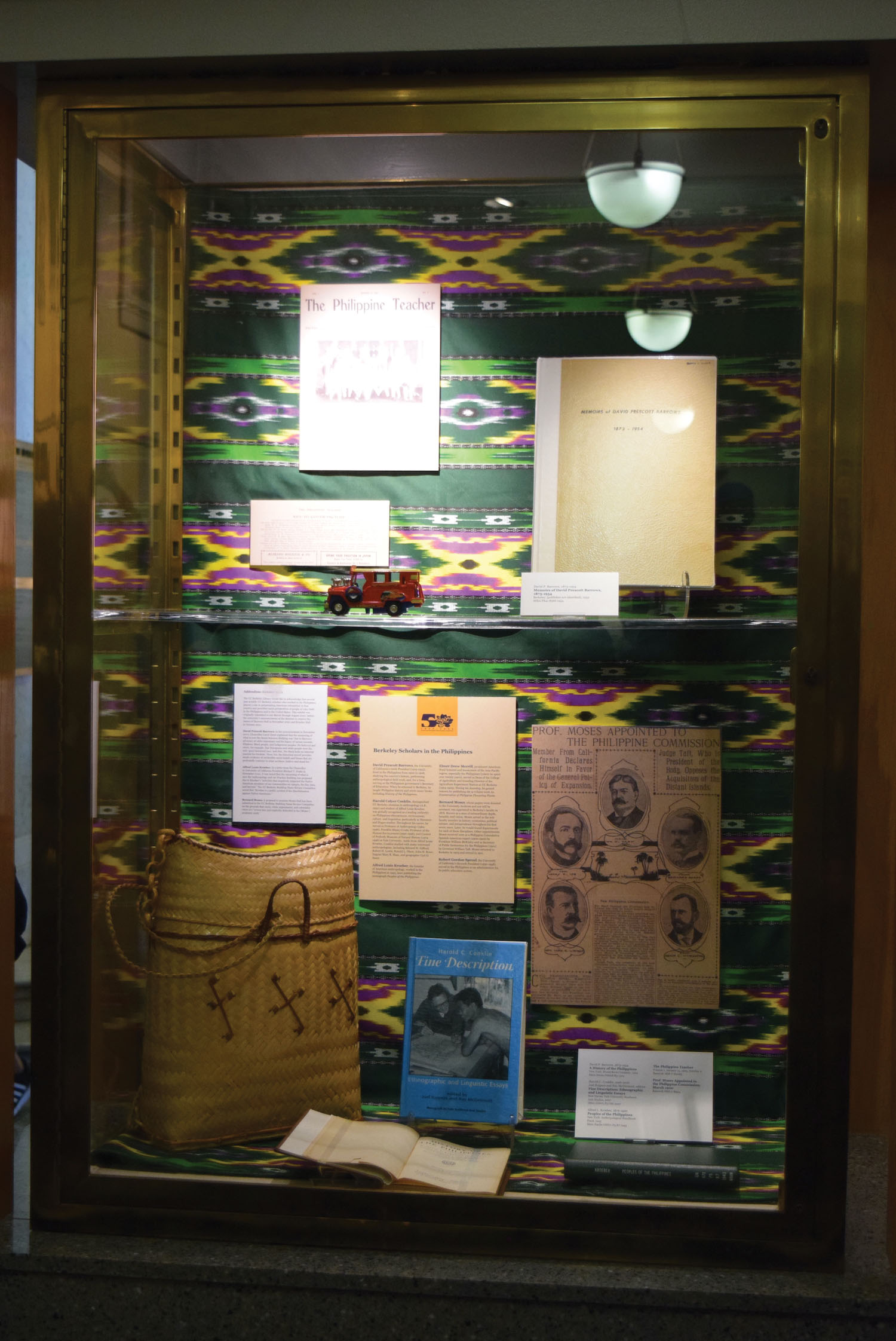
The small exhibit in question was part of the South/Southeast Asia Library 50th Anniversary Exhibit that featured the Philippines. The display, according to a release from the group, “featured the careers and writings of school administrators David Prescott Barrows, Alfred Louis Kroeber and other campus stakeholders justifying the colonization of the Philippines and the inferiority of communities in the Philippines.”
The noontime press conference and protest action featured short speeches from graduate student representative Alex Mabanta, who is also a PhD student at the UC Berkeley School of Law; UC Berkeley advising faculty members Karen Llagas, Joi Barrios and Cynthia Aban; UC Berkeley League of Filipino Students vice chair Denise Cruz; ASUC president Chaka Tellem, ASUC senator Stephanie Wong, graduate assembly external affairs vice president Lucy Andrews; and Andew Ligeralde, who is from the steering committee of the Pilipinx American Graduate Student Association (PAGaSA).
The keynote speaker at the event was Emil De Guzman, a faculty member of the California State University, who was an original student striker with TWLF at UC Berkeley in 1969 and former president of the International Hotel Tenants Association.
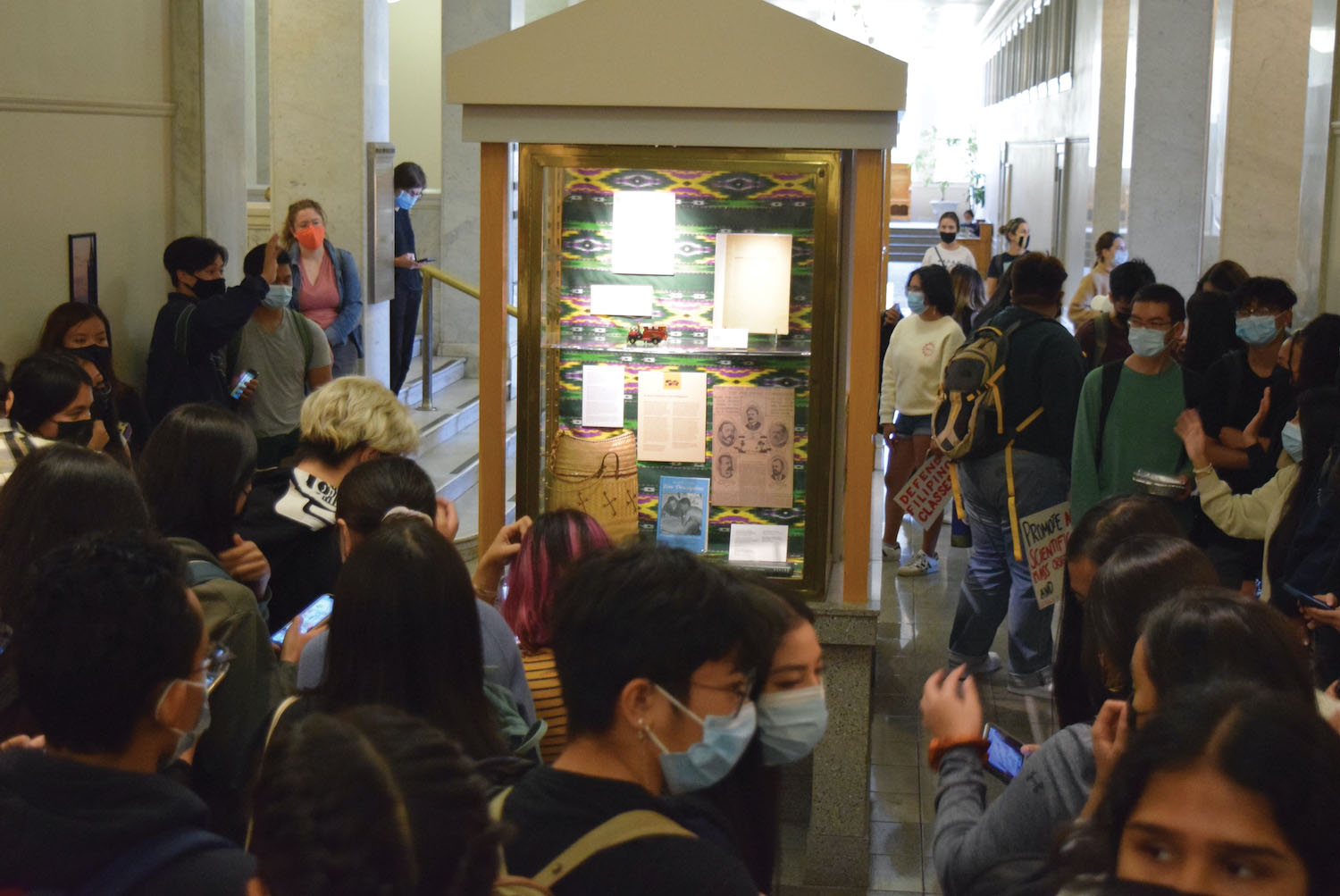
In his remarks, Mabanta decried the exhibit after the university had unnamed buildings and halls named after Barrows and Kroeber, and after UC Berkeley acknowledged that Kroeber’s views “clearly stand in opposition to our university’s values of inclusion and our belief in promoting diversity and excellence.” In addition, Mabanta revealed that twenty-five descendants of Barrows’ family “supported the unnaming, acknowledged the ‘deep pain’ David Prescott Barrows inflicted on many communities, apologized, and offered, in the letter, ‘to sit in conversation with those who are directly affected by Barrows’ legacy’.”
“We condemn the display. We urge the library to acknowledge and apologize for the harm it has caused. We urge the removal of the same books that motivated the unnaming of campus buildings. It is 2021. I cannot believe I have to urge this,” Mabanta said. “And yet, it is 2021, and I can and must believe this because this whole episode is a microcosm of being Pilipinx at UC Berkeley. The wholesale inattention to the thriving Pilipinx communities on campus, communities that have been present for over a century and who have shaped and built this university.”
“During all of Filipino American History Month, not a single campus-sponsored or department-sponsored event was organized to give visibility to Pilipinx communities, except this display on the Philippines. On October 31st the exhibit ends, and these books and the rest of the exhibit are already in the process of being removed – but what justified retaining these books for months, in spite of the outpour of objections raised?” he added.
ASUC officials Tellem and Wong both acknowledged the support of the student association with regard to its protest against the exhibit.
“I believe in our ability to acknowledge how the history of the Philippines is informed by imperial exploitation without commemorating those who laid the groundwork for its expropriation,” Tellem said in his brief remarks.
“When I first arrived at Berkeley, I had a vision of an institution that used its power to debunk systemic beliefs of racial superiority, not showcase them. I am disheartened to walk past a display that only as a side note acknowledges the contributions of past academics to the prevalence of white supremacy. This display is antithetical to the values of the university that this library is meant to support and represent. For the past few years, we’ve made progress in the fight to make the names on our classrooms represent who we are as academics, as students, and as people. We are still reckoning with how that history laid the foundations for the literature and the subjects we study today,” he continued.
“I am not suggesting we ignore the ways our institution has contributed to the systemic misunderstandings of our world. There is a difference between acknowledging our shortcomings and learning from them and highlighting those who perpetuated self-serving narratives of racial superiority. I am grateful for the leadership shown by Alex Mabanta, Senator Stephanie Wong, faculty, students, alumni, and community members at large that have rallied together to demand better from our learning environment. That collaborative spirit is what will drive us to build a better Berkeley in the long run. I challenge campus administrators to look at these books not as illustrations of a historical moment, but as physical reminders of the trauma inflicted on our community members, reopening generational wounds in the very place that is meant to heal them,” he further stated.
Wong, who was asked to sponsor ASUC Senate Resolution 21/22-018, a piece of legislation which condemns the white colonial gaze with which this institution views Pilipinx students and its students of color that unanimously passed recently, echoed the demands of Pilipinx activists, students and faculty in part of her speech.
“First, the library should not only acknowledge and apologize for the harm it has done, but take action to remedy it. This would look like amending the display in a way that Pilipinx students and faculty see fit, representing Pilipinx in the way they would like to be represented, and uplifting their authentic narratives,” Wong declared. “Some might argue that what is currently on display, is an authentic retelling of history, seeing as Barrows, Moses, Sproul, and Krober were all scholars at UC Berkeley. It is incredibly unfortunate that this institution chooses to continue associating itself with these individuals, on the basis that they are their only connection to the Philippines.”
She continued: “Berkeley must abandon this notion and invest in its Pilipinx students who are making history every day and deserve to have their stories uplifted at Doe Library and every single Library on this campus. This brings me to the second demand: Berkeley must build and secure long-asked for programs such as a resource center, language center, and Philippine Studies Program. These are
investments that will support the already amazing work students and faculty are doing, creating a new kind of legacy for Berkeley, one that centers Pilipinx and one that our community can be proud of.”
“Third, the campus should celebrate Pilipinx heritage genuinely, by formally recognizing October as Filipino American History Month. Instead of celebrating those with legacies of racism, we must recognize true heroes like Larry Itliong and Emil De Guzman of whom we have the absolute honor of hosting today as our keynote speaker,” she further said.
De Guzman in his keynote address told the audience of the two big things he learned during his involvement in the many civil rights movements and protest actions he participated in – one was his identity as a person of color, being a Filipino American and Asian American; the other was how he learned to appreciate power.
“When you have thousands of people out here, you can force change… Power can come from money, but not in our case, it was from people. And it wasn’t just Filipinos or Asians, it was a coalition of all kinds of students who joined us, who were on the marches with us, who made the difference, who fought the police,” he said. “Everything that you can do non-violently, do it. But recognize that it has to be done over and over again.”
The victory 52 years ago as they fought for their place in the university, De Guzman said, that gave birth to ethnic studies that has now become law gave rise to community members teaching younger generations about their history and shared narrative through their own eyes and experience, and not from somebody else’s lens.
“If there’s anything I can leave with you, it’s this one point – we can’t ever forget those who came before us,” he said, unfurling a poster of the manongs from Agbayani Village. “These guys were my greatest professors. These were the guys who taught me humanity. I-Hotel tenants taught me humanity, generosity, kindness…they taught me humility.”
“Students and community together is the only way that you can win. Organize, bring the community in this campus so that we can meet with the Chancellor, tell him what we think because that’s the only language that they understand and that means we mean business,” he said as a final point.
The university, through campus spokesperson Janet Gilmore, who is Senior Director of Strategic Communications from the Office of Communications & Public Affairs, issued an email response when contacted by Asian Journal on the Pilipinx community protest versus the exhibit.
“We hear and understand their concerns and will continue to meet with members of the campus community to discuss the matter further. Library officials have already made some modifications to the exhibit within the last few weeks, including by posting an acknowledgement that several Berkeley scholars who worked in the Philippines played a role in perpetuating American colonialism in that country and provided racist perspectives of people of color in the Philippines and in the United States. While individuals such as David Prescott Barrows have a clear legacy of racism towards Filipinos, Black people and Indigenous peoples, they and their work remain part of Berkeley’s history. And for that reason we must exercise extreme care, caution and sensitivity when presenting their work and discussing their legacies,” the statement read as a response to those opposed to the exhibit.
According to the email, the university has “a library exhibit that celebrates the 50th anniversary of the South/Southeast Asia Library, and the Department of South and Southeast Asian Studies. It recognizes the influential scholarship of many Berkeley faculty whose research was enabled in part by the collections in the South/Southeast Asia Library. There is one portion of the exhibit that provides information on the work of five scholars who did research about the Philippines.”
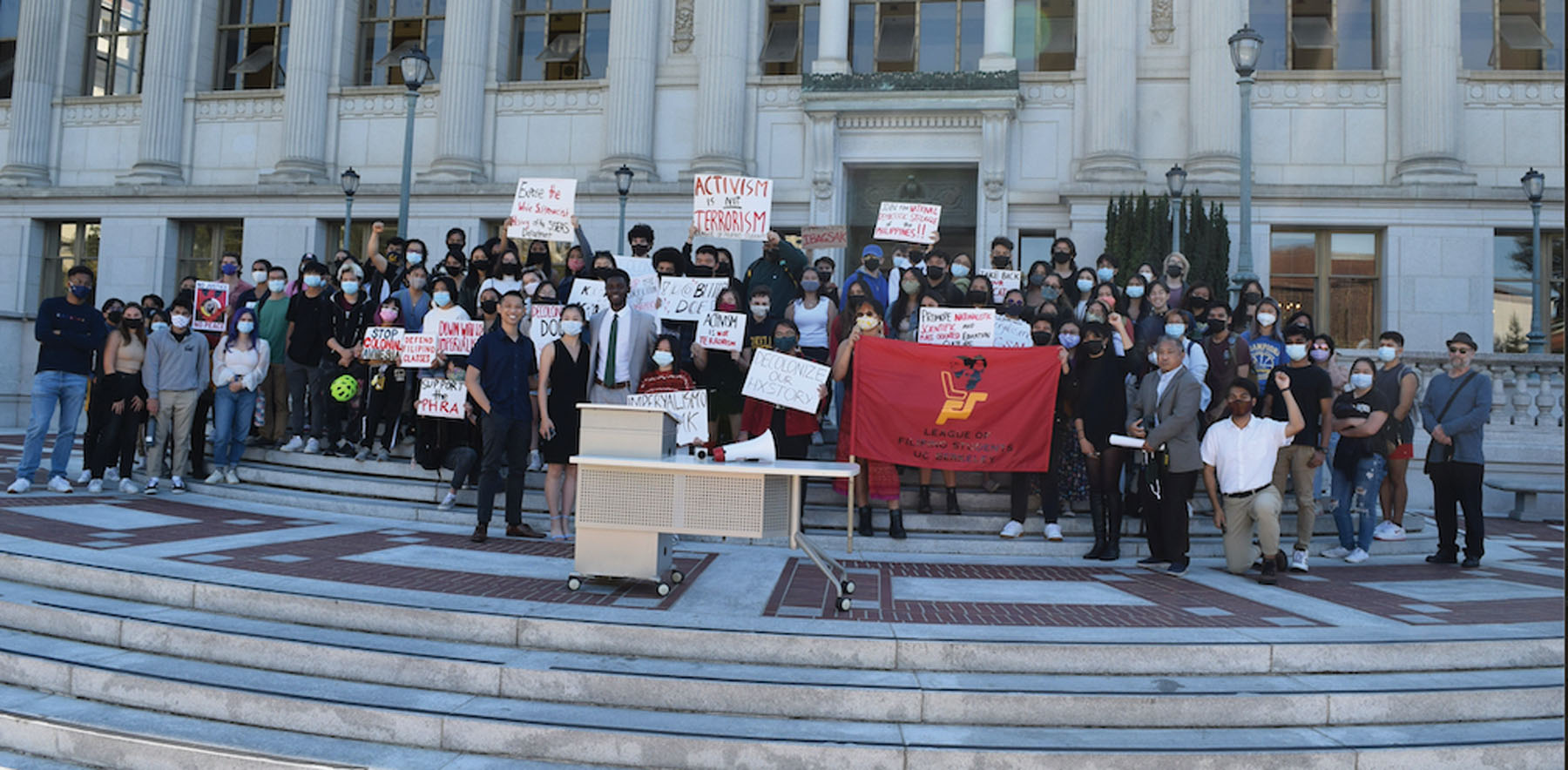
In an interview with Asian Journal, Mabanta said that although he believes the library system reached out to some members of the Pilipinx faculty, prominent faculty member Professor Cathy Choy of the Department of Ethic Studies at UC Berkeley was not consulted. He also said he knows of no Pilipinx students who were consulted on the matter.
“Our hope is to really raise attention to community engagement participatory ways of incorporating lived experience and ways of representation from directly-impacted stakeholders into any kind of content about history, culture, etc., particularly in an exhibit about scholarship and stewardship,” Mabanta said.
The Library has not apologized to the Pilipinx community for the display, according to Mabanta, although it has put a 300-word addendum to the display.
One of the good things that may have come out of this drama is the possibility of future collaborations and engagements within the library system at UC Berkeley.
“What is so important to understand is that the UC Berkeley library system is not a monolith. They are not centralized. They have many different participating library systems. So I can already say that members in other libraries – the Ethic Studies Library, the Bancroft Library – have indicated that they would like to do work in future Filipino American History Months, maybe in 2022, 2023 and 2024. Of course, our ask is for the main library, Doe Library, here at UC Berkeley, to commit to its racial justice statement and to provide the kind of representations of the Philippines in [inaudible]… We hope that the library will continue to invest in public education,” Mabanta revealed, even as he added the hope that the university will return or repatriate materials and artifacts stolen, including human remains, from the Philippines during the American colonial period.
When asked if some quarters may think that the display is just a piece of UC Berkeley history that can be seen for what it is, Mabanta said that even a small exhibit like this only serves to promote hurt within the Filipino American community.
“There are so many slogans like ‘history is written by the victors’ and ‘if you’re not on the table, you’re on the menu’… I think this is a living testament that the Pilipinx community continues to see itself subordinated with white supremacy depictions about them. And so what’s important is to encourage folks to come learn how the Philippines is represented to the global public and hopefully seed to the young people to think about – what is history, what history would you like to tell, how can the narratives of the many people in the Pilipinx community be told, and how can we advance that work. This particular display indicates that we must invest in Philippine history in Filipino American History Month,” Mabanta said.


